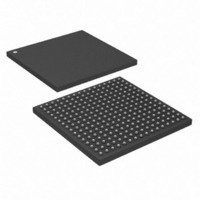DS26518GN+ Maxim Integrated Products, DS26518GN+ Datasheet - Page 48

DS26518GN+
Manufacturer Part Number
DS26518GN+
Description
IC TXRX T1/E1/J1 8PORT 256-CSBGA
Manufacturer
Maxim Integrated Products
Type
Transceiverr
Specifications of DS26518GN+
Number Of Drivers/receivers
8/8
Protocol
T1/E1/J1
Voltage - Supply
3.135 V ~ 3.465 V
Mounting Type
Surface Mount
Package / Case
256-CSBGA
Lead Free Status / RoHS Status
Lead free / RoHS Compliant
- Current page: 48 of 286
- Download datasheet (2Mb)
9.9
The DS26518 framer cores are software selectable for T1, J1, or E1. The receive framer locates the frame and
multiframe boundaries and monitors the data stream for alarms. It is also used for extracting and inserting signaling
data, T1 FDL data, and E1 Si- and Sa-bit information. The receive-side framer decodes AMI, B8ZS line coding,
synchronizes to the data stream, reports alarm information, counts framing/coding and CRC errors, and provides
clock/data and frame-sync signals to the backplane interface section. Diagnostic capabilities include loopbacks,
and 16-bit loop-up and loop-down code detection. The device contains a set of internal registers for host access
and control of the device.
On the transmit side, clock, data, and frame-sync signals are provided to the framer by the backplane interface
section. The framer inserts the appropriate synchronization framing patterns, alarm information, calculates and
inserts the CRC codes, and provides the B8ZS (zero code suppression) and AMI line coding.
Both the transmit and receive path have an HDLC controller. The HDLC controller transmits and receives data via
the framer block. The HDLC controller may be assigned to any time slot, portion of a time slot, or to FDL (T1). The
HDLC controller has separate 64-byte Tx and Rx FIFO to reduce the amount of processor overhead required to
manage the flow of data.
The backplane interface provides a versatile method of sending and receiving data from the host system. Elastic
stores provide a method for interfacing to asynchronous systems, converting from a T1/E1 network to a 2.048MHz,
4.096MHz, 8.192MHz or N x 64kHz system backplane. The elastic stores also manage slip conditions
(asynchronous interface). An IBO (Interleave Bus Option) is provided to allow multiple framers in the DS26518 to
share a high-speed backplane.
9.9.1
DS1 trunks contain 24 bytes of serial voice/data channels bundled with an overhead bit, the F-bit. The F-bit
contains a fixed pattern for the receiver to delineate the frame boundaries. The F-bit is inserted once per frame at
the beginning of the transmit frame boundary. The frames are further grouped into bundles of frames 12 for D4 and
24 for ESF.
The D4 and ESF framing modes are outlined in
12 is ignored if Japanese Yellow is selected.
Table 9-11. D4 Framing Mode
NUMBER
FRAME
10
11
12
Framers
T1 Framing
1
2
3
4
5
6
7
8
9
Ft
1
0
1
0
1
0
Table 9-13
Fs
0
0
1
1
1
0
Table 9-11
48 of 286
shows SLC-96 framing.
and
SIGNALING
Table
A
B
9-12. In the D4 mode, framing bit for frame
DS26518 8-Port T1/E1/J1 Transceiver
Related parts for DS26518GN+
Image
Part Number
Description
Manufacturer
Datasheet
Request
R

Part Number:
Description:
8-port T1/e1/j1 Transceiver
Manufacturer:
Maxim Integrated Products, Inc.
Datasheet:

Part Number:
Description:
Ds26518 8-port T1/e1/j1 Transceiver
Manufacturer:
Maxim Integrated Products, Inc.

Part Number:
Description:
power light source LUXEON� Collimator
Manufacturer:
LUMILEDS [Lumileds Lighting Company]
Datasheet:

Part Number:
Description:
MAX7528KCWPMaxim Integrated Products [CMOS Dual 8-Bit Buffered Multiplying DACs]
Manufacturer:
Maxim Integrated Products
Datasheet:

Part Number:
Description:
Single +5V, fully integrated, 1.25Gbps laser diode driver.
Manufacturer:
Maxim Integrated Products
Datasheet:

Part Number:
Description:
Single +5V, fully integrated, 155Mbps laser diode driver.
Manufacturer:
Maxim Integrated Products
Datasheet:

Part Number:
Description:
VRD11/VRD10, K8 Rev F 2/3/4-Phase PWM Controllers with Integrated Dual MOSFET Drivers
Manufacturer:
Maxim Integrated Products
Datasheet:

Part Number:
Description:
Highly Integrated Level 2 SMBus Battery Chargers
Manufacturer:
Maxim Integrated Products
Datasheet:

Part Number:
Description:
Current Monitor and Accumulator with Integrated Sense Resistor; ; Temperature Range: -40°C to +85°C
Manufacturer:
Maxim Integrated Products

Part Number:
Description:
TSSOP 14/A�/RS-485 Transceivers with Integrated 100O/120O Termination Resis
Manufacturer:
Maxim Integrated Products

Part Number:
Description:
TSSOP 14/A�/RS-485 Transceivers with Integrated 100O/120O Termination Resis
Manufacturer:
Maxim Integrated Products

Part Number:
Description:
QFN 16/A�/AC-DC and DC-DC Peak-Current-Mode Converters with Integrated Step
Manufacturer:
Maxim Integrated Products

Part Number:
Description:
TDFN/A/65V, 1A, 600KHZ, SYNCHRONOUS STEP-DOWN REGULATOR WITH INTEGRATED SWI
Manufacturer:
Maxim Integrated Products

Part Number:
Description:
Integrated Temperature Controller f
Manufacturer:
Maxim Integrated Products










